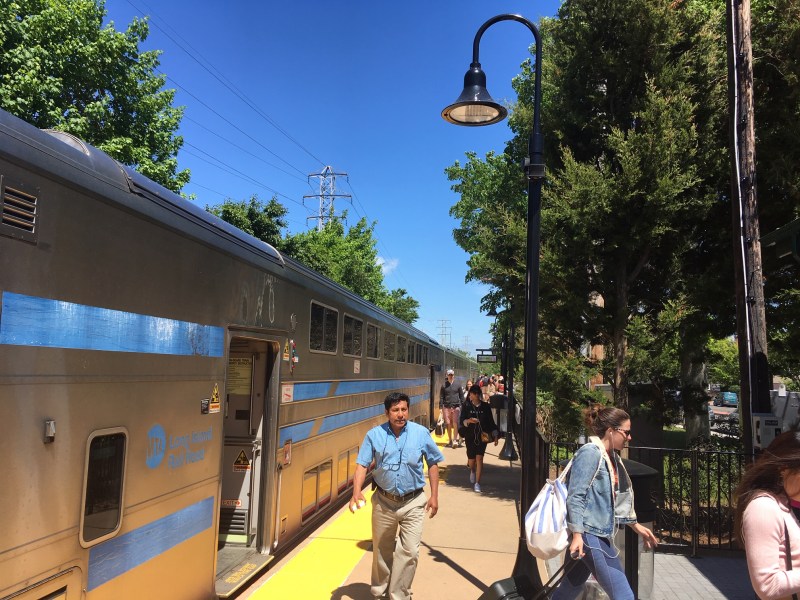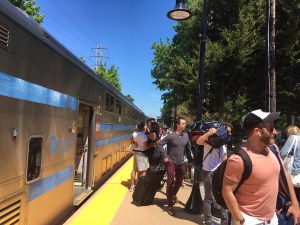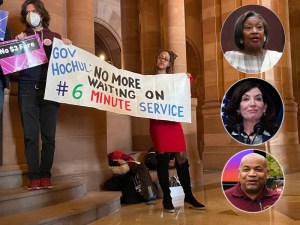Payroll Tax Hike to Save MTA May Completely Exclude New York’s Transit-Rich Suburbs

New York City may be forced to saddle the entirety of a proposed MTA-saving tax hike without any help from the suburbs, according to reports out of Albany — even as new analysis said doing so could cost the region’s transit system $200 million per year.
“The Governor’s proposal was to raise the payroll mobility tax to 0.5 percent for the entire region. Now the plan is to raise it to 0.6 just for New York City,” an outraged Assembly Member Robert Carroll (D-Brooklyn) told Streetsblog on Wednesday afternoon amid ongoing budget negotiations on Wednesday afternoon.
“We have a regional network, why aren’t we having the region pay for it?”
An analysis released Wednesday by the nonpartisan Fiscal Policy Institute, meanwhile, found that exempting suburban counties from the payroll tax hike would leave the MTA with a massive fiscal hole compared to what Gov. Hochul proposed at the outset of the budget process.
“Under the Governor’s proposed 0.16-percent PMT increase, the state would raise $800 million,” wrote Senior Policy Analyst Andrew Perry.
“Exempting the suburban counties in the MTA region from the .16-percent increase would decrease the revenue yield of a higher PMT rate by approximately $200 million, or 25 percent.”
The suburban Long Island Rail Road and Metro-North take up a quarter of the MTA costs devoted to actually moving transit riders, Perry noted.
“Together, the LIRR and Metro-North account for approximately 25 percent of the MTA system’s operating costs. This is consistent with the share of PMT revenues contributed by these counties, also about 25 percent,” he wrote.
“While it may seem that the local communities of Long Island or the Hudson Valley should not be burdened with paying for the MTA, the economic reality is that these communities depend daily on the reliable functioning of the whole MTA system.”
The payroll mobility tax levies the payrolls of businesses who operate in the 12-county MTA region. Gov. Hochul proposed to increase the tax region-wide to fill in the MTA’s gaping fiscal hole, which is over a billion dollars per year between now and 2026.
Under Hochul’s proposal, the highest payroll tax rate — paid by business with payrolls above $437,500 per quarter — would have moved from 0.34-percent to 0.5-percent, raising $800 million per year for the agency.
But Democratic and Republican legislators from the suburbs pitched a fit from the moment Hochul proposed the tax hike — arguing, in essence, that the regional mass transit system is a New York City-only problem.
Three suburban Democratic state senators and one Republican say:
"all counties outside of New York City's five boroughs be exempt from the executive's proposal to expand the MTA Payroll Mobility Tax" pic.twitter.com/inJEXWLNdj
— Zach Williams (@ZachReports) February 20, 2023
For all the grousing from suburban politicians over MTA funding, however, it’s their constituents who rely on it to get to their highly-compensated city-based jobs, Perry said. Half of jobs on Long Island and in the northern suburbs would not exist without the city economy, which in turn cannot exist without the MTA.
“About one-in-six suburban workers commutes to New York City for work. Commuters earn an average wage of $104,200 – 30 percent higher, on average, than the wages of non-commuter suburban residents. These wages account for about one-fifth of total suburban wages,” the budget watchdog explained.
“The higher wages earned by commuters in New York City translate into higher consumer spending in their local economies.”

Yet state lawmakers appear ready to settle on a compromise that raises the payroll tax 0.6 percent in the city but lets the suburban employers completely off the hook — something Carroll called “unconscionable” and “ridiculous.”
Carroll said that legislators pushing for the suburban exemption have not offer any argument for it beyond not wanting their constituencies to pay more — something Carroll said made no sense given the amount of money the MTA has poured into LIRR service.
“They just don’t want to do it, there’s no decent argument,” he said. “They pretend as if they don’t get service when we’ve spent $11 billion on East Side Access, $4 billion on third track. It is shocking.
“The suburbs don’t want to pay for their transit, they don’t want to allow any new housing,” he added. “I don’t understand it. [MTA CEO Janno Lieber] should be screaming from the roof, it’s ridiculous.”
But Lieber declined to rock the boat when asked for comment at the MTA’s monthly board meeting on Wednesday.
“My principal concern is are we getting to the bottom line number that’s necessary to address the MTA deficit,” he said.
“I have to be deferential to the legislature and the governor about the mechanisms that they’re going to choose to use. I have to let that process unfold.”
Allowing the suburbs to evade their financial responsibility to the MTA’s well-being would set a dangerous precedent for future budgets, according to one government watchdog.
“Employers outside of New York City in the MTA region are part of the same regional economy that depends on a healthy MTA, and have a shared responsibility with all MTA stakeholders to make the MTA whole,” Reinvent Albany Senior Policy Advisor Rachael Fauss said.
“To allow one region to be off the hook to solve one of the MTA’s biggest financial crises sets a terrible precedent that will only force others to pay — in this case, NYC taxpayers — reinforcing existing inequities.”
Despite rumors that the budget is close to a done deal, things could still change, Carroll said.
“We’re not passing a budget until next week. There’s no way a budget gets passed until next Tuesday or Wednesday, and we might not until June,” he said.
“I do think this could still change, [but] it would have to take the governor pushing it. I don’t know if she has any will to do that, but if she cared about smart regional transit, she would.”

